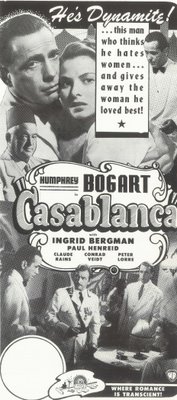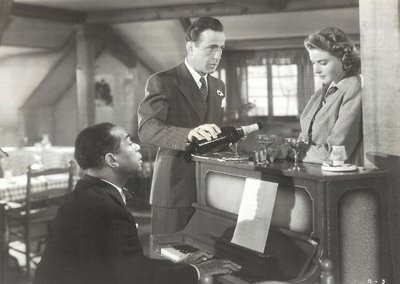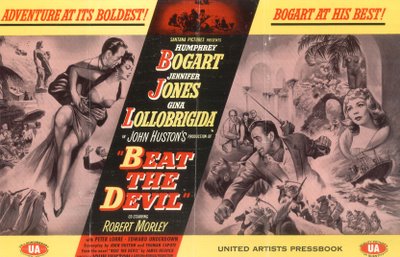

Birth Of The Bogart Cult
When was the Humphrey Bogart cult born? The where is understood to have been the Brattle Theatre at Harvard. We’ve known years of students chanting dialogue to the screen, arriving in costume for Casablanca, etc., long before The Rocky Horror Picture Show. I’ve looked at published sources, as well as web mentions, and found at least five contradictory accounts. I’ve not been to Harvard, nor stepped foot in the Brattle. They do continue running Bogart, it seems. There used to be a festival each year around exam time, double Bogart features a staple. This was said to have begun in the fifties, but just when in the fifties? The Brattle switched from legit to screen shows in 1953. Did Bogart live long enough to be aware of the beginnings of a cult celebrating his films and screen image? It's hard to be sure based on conflicting data. The Brattle’s website is indefinite on the subject. A couple of sources say they ran Casablanca initially on April 21, 1957, barely three months after the actor’s death. And yet, the Casablanca Bar, which later became a restaurant and was located adjacent to the theater, opened its doors in 1955, so I suspect the Brattle ran Casablanca prior to 4/21/57. There was a published account of the first Bogart festival taking place in the summer of 1956. Has the Brattle maintained a record of bookings from that period?



The Brattle is generally credited with having "transformed Humphrey Bogart into a global icon." Everyone assumes it began with the Casablanca revival, but I found a couple of sources crediting Beat The Devil for this. The March 1954 United Artists release did not do well theatrically ($975,132 in domestic rentals), but word got out among intelligentsia that it was a "put-on" of straight crime thrillers Bogart had previously made, and it would later become an art house favorite. Bogart was aware of this --- he dismissed Beat The Devil as "a mess" that "only phonies would like." Apparently, they liked it at the Brattle, and indeed, it is said to have rung opening bell for festivity that would last decades. Bosley Crowther wrote a 1966 article about the Bogart cult for Playboy in which he referred to a Brattle booking of Beat The Devil in 1956, followed by Casablanca and others the following year. Was it Beat The Devil, then, that initiated Casablanca's revival and led to the first flowering of Bogart-mania at Cambridge, or had Casablanca caught on prior to this? By 1960, the theater was running three weeks of Bogart a year. The owners were Bryant Haliday and Cyrus Harvey, Jr. They later established Janus Films as a means of assuring American distribution for foreign films they liked. Both these founders are gone now, and I haven't seen interviews with either regarding origin of the cult. Bogart’s backlog was making its way to widespread TV distribution when he died, and that surely would not have gone unnoticed --- other stars of his generation, including Clark Gable, commented on this to the press on several occasions. It’s been assumed that Bogart died without knowing of Bogie's rebirth among college audiences, but I wonder. Can anyone out there tell us just when this cult had its beginnings?
3 Comments:
In regards to Janus Films- Bryant Halliday passed away in 1996. Not sure about Cyrus Harvey Jr., though.
I hope you get some definitive answers to your questions, as I'd like to know myself. I remember the burgeoning Bogie cult (I went to college in the '60s, after all), but I'm also old enough to remember when he was still alive. At the time of his death, if memory serves, his best-remembered movies were The African Queen, The Caine Mutiny, and maybe The Maltese Falcon and High Sierra; Casablanca was remembered as a good wartime morale-booster, hugely popular "in its day" but a bit of a relic "now" (i.e., mid-1950s). I suspect the Brattle deserves credit not only for igniting the Bogart cult, but for the rediscovery of Casablanca as well.
Sort of off topic, but I'm curious about your source for the information you quote on film grosses. It's interesting to see in black and white how well a film did--or didn't--do, and how that sometimes contrasts with what hearsay evidence tells us.
Post a Comment
<< Home